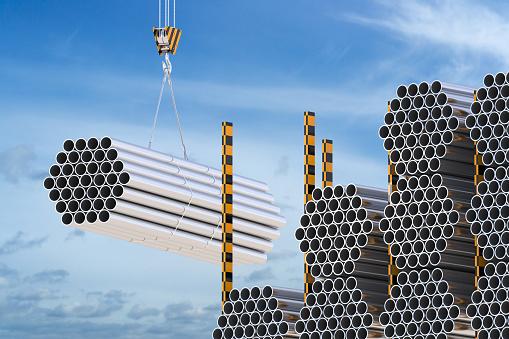Contributing Writer
- FMA
- The Fabricator
- FABTECH
- Canadian Metalworking
Categories
- Additive Manufacturing
- Aluminum Welding
- Arc Welding
- Assembly and Joining
- Automation and Robotics
- Bending and Forming
- Consumables
- Cutting and Weld Prep
- Electric Vehicles
- En Español
- Finishing
- Hydroforming
- Laser Cutting
- Laser Welding
- Machining
- Manufacturing Software
- Materials Handling
- Metals/Materials
- Oxyfuel Cutting
- Plasma Cutting
- Power Tools
- Punching and Other Holemaking
- Roll Forming
- Safety
- Sawing
- Shearing
- Shop Management
- Testing and Measuring
- Tube and Pipe Fabrication
- Tube and Pipe Production
- Waterjet Cutting
Industry Directory
Webcasts
Podcasts
FAB 40
Advertise
Subscribe
Account Login
Search
Federal Appeals Court turns back steel tariff challenge
Court reinforces the president’s right to levy trade penalties on imports
- By Stephen Barlas
- July 7, 2022

Importers of steel sheet and pipe lost a recent court bid looking to put an end to the President Trump-era steel tariffs. AlexLMX/iStock/Getty Images Plus
The U.S. Court of Appeals for the District of Columbia Circuit dealt steel importers their latest defeat as they continue to try and get out from under the 25% tariff on imported steel first instituted by the Trump Administration.
The top federal court of appeals upheld an earlier U.S. Court of International Trade decision that set aside a challenge to the tariffs by USP Holdings Inc., PSK Steel Corp., Dayton Parts LLC, Jordan Intl. Co., and Borusan Mannesmann Pipe U.S. Inc. Those companies alleged they had paid tariffs in various amounts ranging from $500,000 to nearly $35 million.
Lewis Leibowitz, who represented the steel importers at the appeals court, did not respond to an email asking whether steel importers had run out of legal options for challenging the 25% tariffs. The plaintiffs made a number of pretty technical legal arguments in both courts, and in June those arguments were dispatched by the appeals court. Those arguments revolved around whether Trump’s tariffs, imposed in 2018, were a reviewable action, whether he should have set a deadline for ending the tariffs, and whether the tariffs were imposed because of an “imminent” national security threat.
When Trump established the 25% tariff on imported steel and a 10% tariff on aluminum, he cited the Trade Expansion Act of 1962 as giving him the right to levy the tariffs. The act has three subsections with provisions that came into play during the two court cases. Those sections set up a number of legal tests which have been explicated by a number of past court cases.
One of those sections requires the president to “determine the nature and duration of the action.” USP and others argued Trump’s action failed to set a duration for the tariffs based on the fact that his “Proclamation 9705 did not indicate any kind of time period during which these import adjustments would last” and failed to set an end date or other criteria. But the appeals court said that did not matter because section 232 of the Trade Act includes no limits on the duration of the action. Proclamation 9705 was Trump’s concurrence with the secretary of commerce’s finding that steel imports constituted a national security threat under the Trade Adjustment Act.
The steel importers also argued that if a president wants to impose national security tariffs, he must find that imports pose “a serious risk near in time.” But the appeals court disagreed. The court said the factors that the president and secretary are directed to consider in making their determinations do not mention imminence, but focus instead on long-term health of and adverse effects on the relevant domestic industry.
New Rolodex for Manufacturing Support
No one would call the new manufacturing bill headed for congressional approval a major step forward. But these days, given supply chain issues, any little bit helps.
The Manufacturing.gov Act the Senate passed in 2021 and a House subcommittee approved in June by a vote of 22-0 simply tells the Department of Commerce to establish a new section on its manufacturing.gov website that will provide contact information for each of the numerous manufacturing programs peppered throughout the federal government. Call it a manufacturer’s Rolodex.
The Advanced Manufacturing National Program Office at the National Institute of Standards and Technology (NIST) maintains the manufacturing.gov website. The website provides little information, however, to help U.S. manufacturers access the numerous federal resources that support manufacturers and their workers.
A Government Accountability Office (GAO) report in 2017 identified 58 programs in 11 federal agencies that reported providing support to U.S. manufacturing by fostering innovation through research and development, assisting with trade in the global marketplace, helping job seekers enhance skills and obtain employment, and providing general financing or business assistance.
subscribe now

The Fabricator is North America's leading magazine for the metal forming and fabricating industry. The magazine delivers the news, technical articles, and case histories that enable fabricators to do their jobs more efficiently. The Fabricator has served the industry since 1970.
start your free subscriptionAbout the Author

Stephen Barlas
- Stay connected from anywhere

Easily access valuable industry resources now with full access to the digital edition of The Fabricator.

Easily access valuable industry resources now with full access to the digital edition of The Welder.

Easily access valuable industry resources now with full access to the digital edition of The Tube and Pipe Journal.
- Podcasting
- Podcast:
- The Fabricator Podcast
- Published:
- 04/16/2024
- Running Time:
- 63:29
In this episode of The Fabricator Podcast, Caleb Chamberlain, co-founder and CEO of OSH Cut, discusses his company’s...
- Industry Events
16th Annual Safety Conference
- April 30 - May 1, 2024
- Elgin,
Pipe and Tube Conference
- May 21 - 22, 2024
- Omaha, NE
World-Class Roll Forming Workshop
- June 5 - 6, 2024
- Louisville, KY
Advanced Laser Application Workshop
- June 25 - 27, 2024
- Novi, MI































